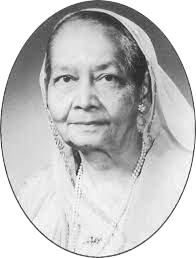
Srimati Mona Chandravati Gupta established what is now, - since Independence in 1947 - The Nari Sewa Samiti - An August institution in Lucknow, Uttar Pradesh, INDIA. It was originally started as the Zenana Park League, in December 1931, and then became the Women’s Social League in 1938.
Smt. Mona Chandravati Gupta was born in Burma, - now Myanmar, - on 20th October 1896, to a progressive Doctor; a distinguished member of the Indian Medical services, Col. Kanta Prasad – recipient of the Kaiser-e-Hind medal at the Delhi Durbar in 1911 for Public Service - and his wife Manohari Devi.
She had her early education in Rangoon, and then in London, where she lived with her mother and attended St Paul’s Day School, while her father continued to serve in Burma.
She returned to India in 1913 after completing her Senior Cambridge. At an early age; during her formative schooling years - even though she was groomed under two European Governesses and her upbringing had a strong Western influence - she developed Patriotic and Nationalistic leanings. She developed a love for Indian culture and all things Indian.
She joined The Diocesan College in Kolkata for B.A. classes, graduated with distinction, and took up the job of Vice-Principal of The Government Girls College in Lucknow.
Mona’s father retired and joined the Banaras Hindu University where he unfortunately died after a buggy accident, which left her mother injured and widowed.
She met her future husband, Shri Harnath Sahay Gupta, a distinguished Lucknow Barrister - who had earlier been suggested as an eligible suitor by her late father - when she needed legal help in sorting out matters relating to the estate that her father had left behind in Burma and in England.
Shri Harnath Sahay Gupta, a devoted husband, and a far sighted and liberal thinker, made available his knowledge, his resources, and his properties, when he saw the single-minded sense of purpose with which his beloved wife pursued the cause of upliftment of the girl child and improvement and amelioration of the lot of Indian women - whether they belonged to the economically weaker sections of society, or whether they were the subject of the indefensible prejudices faced by widows in the conservative and orthodox Indian milieu.
Smt. Mona Chandravati Gupta received the Kaiser-e-Hind in 1939 for her exemplary work for the upliftment of women in India.
As early as 1927, she launched a drive to draw out women from the Purdah system. At the municipal gardens of Lucknow, which became her base, she gave and organised lectures and demonstrations on health, personal and public hygiene, and created awareness on social issues such as the evils of child marriage.
As a member of the Legislative Council of the United Provinces, she campaigned for, and introduced legislation in the form of ‘ The United Provinces Hindu Widows’ Homes Control Bill ‘. This document is a ‘must read’ for any progressive thinker and student of social history of those times – when bereaved widows both young as well as old, through the misfortune of having lost their husbands – were treated as persona non grata, as outcasts in family and society; and often ended up in widows’ homes where unscrupulous, seeming benefactors, subjected them to immoral trafficking.
Shrimati Mona Chandravati Gupta, enlightened as she was by her education, was gifted with forward thinking values. She believed in women’s emancipation, women’s education, dignity for the widow, and the upliftment of destitute women.
She was a visionary torchbearer, who believed that education of the girl child and of women in general, would lead to an evolved and progressive social structure, unbridled by the constraints imposed by orthodox taboo and superstition; and would lead to the overall progress of an emerging nation on the threshold of independence; the country that she loved as a true patriot - India.